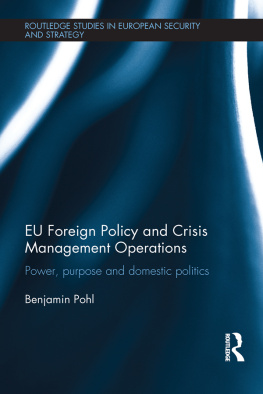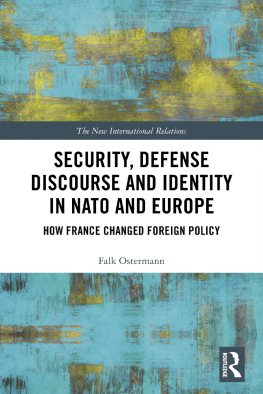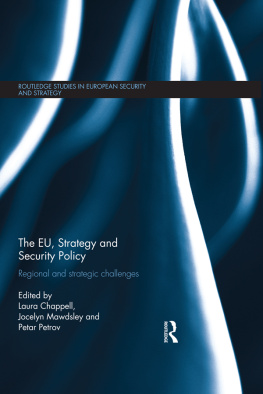
French Defence Policy Since the End of the Cold War
This book describes the evolution of French defence policy since the end of the Cold War.
For the past 30 years, there have been significant changes to French defence policy as a result of several contextual evolutions. Changes include shifts in the global balance of power, new understandings of the notion of international security, economic downturns, and developments in European integration. Yet despite these changes, the purpose of Frances grand strategy and its main principles have remained remarkably stable over time. This book identifies the incentives, representations, and objectives of French defence policy. The authors examine the general mechanisms that influence policy change and military transformation in democracies, the importance of status-seeking in international relations, the processes of strategy-making by a middle power, and the dilemmas and challenges of security cooperation. By doing so, the book raises a number of questions related to the ways states adjust (or not) their security policies in a transformed international system. This book makes French-language sources available to non-French-speaking readers and contributes to a better understanding of a country that is at the forefront of Europes external action.
This book will be of great interest to students of defence studies, French politics, military studies, security studies, and International Relations.
Alice Pannier is Research Fellow and head of the Geopolitics of Technologies programme at the the French Institute of International Relations (IFRI).
Olivier Schmitt is Professor of Political Science at the Center for War Studies, University of Southern Denmark, and currently Head of Research and Studies at the French Institute of Higher National Defence Studies (IHEDN).
Cass Military Studies
Countering Insurgencies and Violent Extremism in Asia
Edited by Shanthie Mariet DSouza
Commercial Insurgencies in the Networked Era
The revolutionary armed forces of Colombia
Oscar Palma
The Politics of Military Families
State, work organizations, and the rise of the negotiation household
Edited by Ren Moelker, Manon Andres, and Nina Rones
Organisational Learning and the Modern Army
A new model for lessons-learned processes
Tom Dyson
CivilMilitary Relations in International Interventions
A new analytical framework
Karsten Friis
Defence Diplomacy
Strategic engagement and interstate conflict
Daniel H. Katz
Management and Military Studies
Classical and current foundations
Joseph Soeters
Understanding Insurgent Resilience
Organizational structures and the implications for counterinsurgency
Andrew D. Henshaw
Military Strategy of Middle Powers
Competing for security, influence and status in the 21st century
Hkan Edstrm and Jacob Westberg
Military Mission Formations and Hybrid Wars
New sociological perspectives
Edited by Thomas Vladimir Brond, Uzi Ben-Shalom and Eyal Ben-Ari
French Defence Policy Since the End of the Cold War
Alice Pannier and Olivier Schmitt
For more information about this series, please visit: https://www.routledge.com/Cass-Military-Studies/book-series/CMS
French Defence Policy Since the End of the Cold War
Alice Pannier and Olivier Schmitt
First published 2021
by Routledge
2 Park Square, Milton Park, Abingdon, Oxon OX14 4RN
and by Routledge
52 Vanderbilt Avenue, New York, NY 10017
Routledge is an imprint of the Taylor & Francis Group, an informa business
2021 Alice Pannier and Olivier Schmitt
The right of Alice Pannier and Olivier Schmitt to be identified as authors of this work has been asserted by them in accordance with sections 77 and 78 of the Copyright, Designs and Patents Act 1988.
All rights reserved. No part of this book may be reprinted or reproduced or utilised in any form or by any electronic, mechanical, or other means, now known or hereafter invented, including photocopying and recording, or in any information storage or retrieval system, without permission in writing from the publishers.
Trademark notice : Product or corporate names may be trademarks or registered trademarks, and are used only for identification and explanation without intent to infringe.
British Library Cataloguing-in-Publication Data
A catalogue record for this book is available from the British Library
Library of Congress Cataloging-in-Publication Data
A catalog record has been requested for this book
ISBN: 978-1-138-08462-9 (hbk)
ISBN: 978-1-315-11171-1 (ebk)
Typeset in Times New Roman
by Deanta Global Publishing Services, Chennai, India
Contents
| Women active duty military personnel in the armed forces of NATO member states in 2017. (Source: NATO) |
| French defence budgets (Constant USD 2017. Source: SIPRI) |
| Change in total spending, day-to-day spending, and equipment spending |
| French equipment expenditure and share of European collaborative procurement, 20052017 |
| Scenarios in the 1994 white paper |
| Size of the French armed forces |
| Format reduction in the Military Programming Law 20092014 (Sample) |
| Main French defence companies |
| List of major French military interventions in Africa since the end of the Cold War |
Olivier Schmitt gratefully acknowledges funding from the Gerda-Henkel Stiftung (grant AZ 12/KF/17), the Independent Research Fund Denmark (grant 95-556-25107), and the Carlsberg Foundation (grant CF17-0148). The views expressed herein are those of the authors and do not necessarily represent the views of the Gerda-Henkel Stiftung, the Independent Research Fund Denmark, or the Carlsberg Foundation.
The authors would like to thank Julien Malizard and Quentin Lopinot for comments on earlier versions of this book. This book is the result of the authors several years of research on French defence policy, and we are grateful to the many individuals we interviewed or with whom we have discussed this topic.
As every time we are faced with historic challenges, our reaction must be the same: renewed ambition and audacity. We must shoulder our responsibilities. We have the choice of either taking back control of our destiny or aligning ourselves with any power whatsoever, thereby abandoning the idea of any strategies of our own. An awakening is needed. Overhauling the world order to further peace is the course we must follow, and France and Europe have a historic role to play.
Emmanuel Macron, speech at the cole de Guerre (official translation), 7 February 2020
As Emmanuel Macron was giving his awaited speech on defence and deterrence strategy in February 2020, at the cole de Guerre , where no president had spoken since De Gaulle, the French defence apparatus was mobilised in full swing on French territory and across the globe: French troops were deployed in a combat operation in the Sahel and in defensive missions under British command in Estonia; ballistic missile submarines patrolled the oceans to guarantee the credibility of the French nuclear deterrent; soldiers from the Foreign Legion protected the European spaceport in Kourou, French Guiana; and the Minister for the Armed Forces Florence Parly was negotiating with her German counterpart to unlock the funds necessary for the development of the next-generation fighter aircraft that will replace the Rafale. Soon after, French troops were mobilised in response to the COVID-19 pandemic as part of Operation Resilience: they helped transport and distribute medical equipment and patients; a field hospital was deployed to ease the burden on the public health system; and the air force sent aircraft to repatriate French nationals from Wuhan, China.















